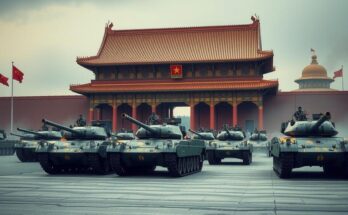Dmitry Polyanskiy criticized the Biden administration’s actions on the Ukraine conflict during an interview, asserting they exacerbated the situation. He praised the potential role of Saudi Arabia in diplomatic efforts while advocating for a two-state solution regarding Israel-Palestine. He also supported Sudan’s government and highlighted Russia’s commitment to Syria during its transitional phase.
In a recent interview on “Frankly Speaking,” Dmitry Polyanskiy, Russia’s first deputy permanent representative to the UN, criticized the Biden administration’s involvement in the Ukraine conflict, claiming it exacerbated the situation rather than alleviating it. He asserted that a change in perspective could have resolved issues years prior, calling actions by the previous American administration detrimental towards Russia and ultimately contributing to the escalation of the conflict leading to the military operation in February 2022.
Polyanskiy further accused the Biden administration of fueling the war, stating, “The Biden administration was one of those who was fueling the war, who was trying to do everything to inflict a strategic (defeat) on Russia,” drawing a clear distinction with former President Donald Trump’s administration, which he described as more realistic and aligned with battlefield realities.
During talks in Saudi Arabia, a draft agreement was established regarding a ceasefire near the Black Sea in return for eased sanctions on Russia. Polyanskiy praised Saudi Arabia’s emerging role in international diplomacy and commended their proactive approach in facilitating discussions among the involved parties. He noted, “The world is changing and new centers of diplomatic activity are emerging,” emphasizing Saudi Arabia’s potential for becoming a diplomatic capital in the context of the Russia-Ukraine situation.
While addressing broader issues, Polyanskiy underscored Russia’s stance on the Israeli-Palestinian conflict, advocating for a two-state solution. He acknowledged the limitations of Russia’s influence over Israel compared to that of the United States, remarking, “It’s hard for us to put pressure on Israel… the US role here is indispensable to put Israel on a more reasonable path.” He stressed the necessity of Arab countries uniting for progress on this issue, positing that their collective voice could impact future negotiations favorably.
On the situation in Sudan, Polyanskiy reiterated Russia’s support for the Sudanese government, asserting that military victories should promote stability. He deemed Russia’s veto on a recent ceasefire resolution as a necessity due to perceived biases within its language, arguing that humanitarian concerns were not being adequately addressed.
Lastly, Polyanskiy spoke about developments in Syria following the ousting of Bashar Assad, expressing Russia’s commitment to maintaining robust relations while supporting a peaceful transition that encompasses all segments of Syrian society. He emphasized Russia’s historical connections with Syria and a desire for constructive aid during the transitional phase to foster long-term stability.
In summary, Dmitry Polyanskiy articulated Russia’s critical perspective on the Biden administration’s role in the Ukraine conflict, the emerging diplomatic significance of Saudi Arabia, and the importance of addressing wider geopolitical issues. He consistently advocated for unity among Arab nations regarding the Palestinian issue, supported the Sudanese government, and reaffirmed Russia’s commitment to fostering durable relations with Syria during its transitional period. The insights offered reflect Russia’s strategic positioning and aspirations in current international affairs.
Original Source: www.arabnews.jp




